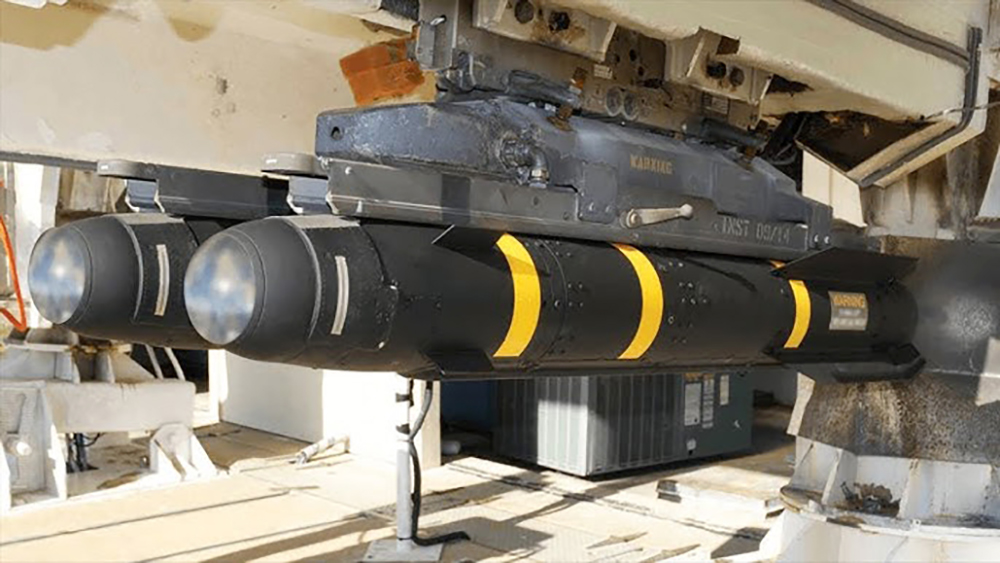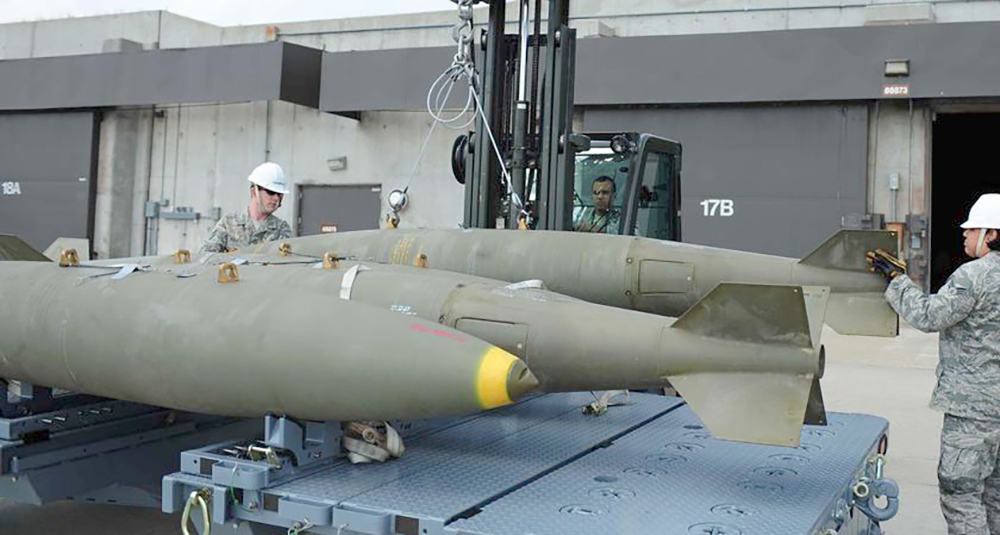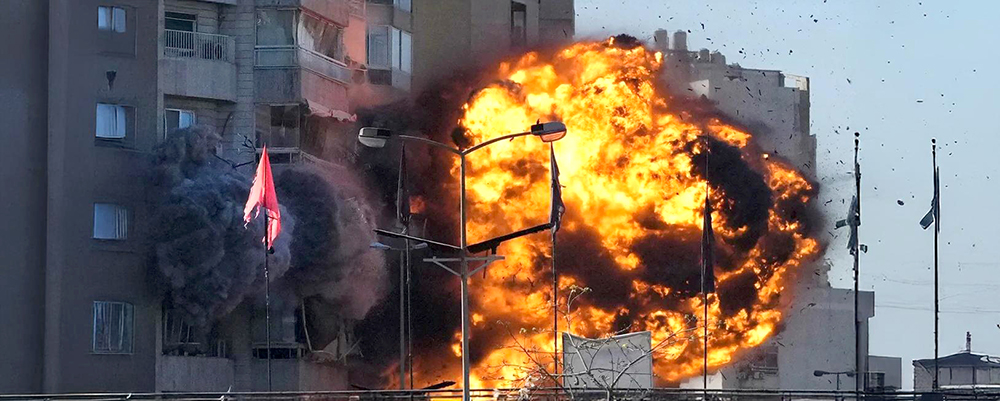|
Getting your Trinity Audio player ready...
|
Edited by: Fern Sidman
In a significant move that highlights the evolving dynamics of U.S. foreign policy under the Trump administration, the State Department has formally notified Congress of its decision to proceed with an $8.4 billion arms sale to Israel. As was reported by The New York Times on Sunday, this decision bypasses an informal congressional review process, effectively sidelining a key mechanism through which lawmakers scrutinize such transactions. This development follows a recent meeting between President Donald Trump and Israeli Prime Minister Benjamin Netanyahu, during which Trump vowed to transform the war-ravaged Gaza Strip into what he called a “Riviera of the Middle East.”
The notification, issued last Friday, was accompanied by two public statements from the Pentagon detailing key components of the arms package. According to the information provided in The New York Times report, the sale includes 3,000 Hellfire air-to-ground missiles valued at $660 million, along with $6.75 billion worth of bombs and precision guidance kits. Notably absent from the Pentagon’s announcements was any mention of artillery shells, which were included in the package as part of a direct commercial sale that did not require a formal public disclosure. The administration’s decision to expedite the process reflects its strategic commitment to ensuring that Israel maintains its qualitative military edge in the region.
As The New York Times report indicated, the former Biden administration initially unveiled the $8 billion weapons deal in early January, initiating an informal review process by sending the proposed sale to both the House Foreign Affairs Committee and the Senate Foreign Relations Committee. This customary review period allows lawmakers to raise concerns, request additional information, and potentially stall or modify the deal. While leading Republicans on these committees quickly endorsed the transaction, Democratic Representative Gregory W. Meeks of New York exercised his prerogative to press for further details, thereby delaying the process.

Despite Meeks’ efforts, the State Department proceeded with the sale after the review had remained pending for more than 20 days, which The New York Times noted is the standard timeframe allotted for congressional oversight of arms sales to Israel. This action has effectively nullified the ability of lawmakers to exert influence over the deal, as Congress would now need an overwhelming two-thirds majority in both the House and Senate to halt the transaction—an outcome widely regarded as improbable given bipartisan support for Israel’s defense capabilities.
Meeks, expressing his frustration over the administration’s maneuvering, condemned what he described as a “blatant disregard of longstanding congressional prerogative.” In a statement reported by The New York Times, he reaffirmed his unwavering support for Israel’s security needs but made it clear that such support should not come at the expense of due process and transparency. According to Meeks, the administration failed to provide satisfactory responses to his inquiries, neglecting to offer the kind of detailed documentation and justification that typically accompany such significant arms transactions.
Although the legality of the State Department’s action is not in question, the implications of this move extend beyond procedural concerns. As the report in The New York Times emphasized, Meeks views this decision as a broader challenge to the traditional balance of power between the executive and legislative branches. By unilaterally advancing the sale without substantive engagement with Congress, the administration has set a precedent that could erode the role of lawmakers in overseeing U.S. arms exports. This shift has raised alarms among those who fear an increasing concentration of foreign policy decision-making within the executive branch, particularly in matters related to military assistance and strategic alliances.
As the arms sale moves forward, its long-term ramifications remain to be seen. While Israel continues to benefit from robust U.S. military support, The New York Times report suggested that the procedural controversy surrounding this transaction may fuel renewed debates over the scope of congressional oversight in foreign arms deals.
In an ongoing demonstration of executive power over arms sales, the United States has repeatedly invoked emergency provisions to bypass congressional oversight, a practice that spans multiple administrations. As The New York Times reported, President Donald Trump set a precedent in 2019 when he declared an “emergency” concerning Iran. This allowed then-Secretary of State Mike Pompeo to push forward with arms sales to Saudi Arabia and the United Arab Emirates despite Congress still being in the process of reviewing the transactions. Pompeo’s move triggered an investigation by the State Department’s inspector general, calling attention to concerns about executive overreach in foreign arms dealings, as report by The New York Times.
Although Friday’s arms notification was issued without an emergency declaration, the use of such measures remains a crucial aspect of U.S. arms transfer policy. The New York Times report highlighted that President Joe Biden’s administration employed a similar tactic in 2023, utilizing the same emergency provision to expedite arms sales to Israel. This shines a spotlight on a pattern wherein different administrations, regardless of party affiliation, have found ways to circumvent congressional review when pursuing weapons deals that align with their foreign policy objectives.
Beyond emergency provisions, Congress is actively reviewing Israel’s request for a license to purchase 5,000 assault rifles from American manufacturers, according to The New York Times. This transaction is separate from an $8 billion arms package currently under discussion. The State Department, which plays a key role in authorizing such transfers, could soon present additional requests for congressional review. As The New York Times report noted, under the Biden administration, the State Department previously delayed a license that would have allowed Israel to acquire 24,000 U.S.-made assault rifles, signaling that even in the absence of an emergency declaration, arms sales remain a politically and diplomatically sensitive issue.

In the case of direct commercial sales, the process requires a foreign government to request a license from the U.S. State Department in order to purchase weapons from private American manufacturers. The New York Times reported that these transactions, while distinct from government-to-government sales, still fall under strict regulatory scrutiny. The former Biden administration’s past hesitations regarding the sale of tens of thousands of U.S.-made assault rifles to Israel suggest that decisions regarding arms exports often involve a complex interplay between national security priorities, political pressures, and international obligations.
The ongoing debates surrounding arms transfers to the Middle East illustrate a persistent struggle between the executive branch’s authority and Congress’s oversight responsibilities. The New York Times report highlighted how successive administrations, whether Republican or Democrat, have leveraged emergency provisions or strategic delays to advance or restrain arms deals in accordance with their geopolitical strategies. With Israel’s pending requests for additional assault rifles and further arms licenses expected to be submitted for review, the balance of power in U.S. foreign military sales remains a subject of critical examination, as The New York Times reported.
In a demonstration of the deep and strategic alliance between the United States and Israel, Defense Secretary Pete Hegseth welcomed Israeli Prime Minister Benjamin Netanyahu to the Pentagon last Wednesday for high-level discussions on military cooperation and regional security. The meeting followed Netanyahu’s discussions with President Donald Trump at the White House the previous evening. According to a report on the Department of Defense (DoD) website, Hegseth reaffirmed the United States’ unwavering commitment to Israel’s security and emphasized the shared goal of maintaining peace through strength—an approach that has guided U.S. defense strategy under the Trump administration.
During the meeting, Hegseth placed a strong emphasis on the long-standing U.S.-Israel partnership, asserting that the alliance is built on mutual security interests and a commitment to countering common adversaries. The DoD report said that Hegseth highlighted America’s steadfast support for Israel and expressed confidence that defense cooperation between the two nations will only continue to grow. “We’re honored to stand alongside you and stare down many of the same threats that you do,” Hegseth told Netanyahu, as cited in the DoD report. “Under President Trump’s leadership, just like you, we are totally committed to achieving peace through strength.”
Further strengthening the defense relationship, Hegseth highlighted ongoing efforts to enhance the U.S. defense industrial base, ensuring that Israel receives advanced military capabilities to address evolving security threats. According to the report on the DoD website, Hegseth pointed to recent weapons deliveries that were previously withheld, specifically munitions vital for Israel’s counterterrorism operations. “We’ve supplied munitions that were previously not supplied and that are useful in eradicating radical enemies, and we are committed to continuing to do so,” Hegseth stated, signaling a strategic shift in U.S. military aid to Israel.
One of the most significant developments in U.S. military assistance to Israel was the authorization of 2,000-pound bombs for delivery, a decision finalized on January 25, 2025. The DoD report confirmed that these powerful munitions had previously been held back but were now cleared for shipment as part of America’s reinforced commitment to its ally. President Trump addressed reporters at the time, affirming that the weapons had already been purchased and that Israel had been awaiting their release “for a long time.” The decision marks a clear departure from prior hesitation in approving certain high-impact weaponry for Israel, demonstrating a recalibrated U.S. policy toward arms transfers in the region.

Hegseth also used the meeting to highlight his broader mission as Secretary of Defense: to rebuild the strength and deterrence capabilities of the U.S. military. The DoD reported that Hegseth underscored the Trump administration’s focus on revitalizing America’s military posture and reinforcing the nation’s global leadership through deterrence. “I hope you’ve noticed here at the Defense Department, under President Trump, we are laser-focused on reviving the warrior ethos, on rebuilding America’s military and reestablishing deterrence,” Hegseth remarked, noting that Israel has successfully implemented a similar doctrine to secure its position in the Middle East.
Netanyahu echoed Hegseth’s sentiments, reinforcing the shared belief that military strength is essential for ensuring peace. The DoD reported that Netanyahu explicitly linked Israel’s national security doctrine to that of the United States, asserting that “the only way to get peace, and enduring peace, is by being very, very strong.” He praised the Trump administration’s support and the latest decision to provide Israel with the necessary tools for its defense. “With our alliance and your support, including the decision … of supplying Israel the much-needed tools for our defense, we are a lot stronger than we’ve ever been,” Netanyahu stated, as cited by the DoD report.
The discussions at the Pentagon serve as yet another indication that the U.S.-Israel defense relationship is entering a new era of heightened cooperation. As the DoD report noted, the Trump administration’s policy of “peace through strength” aligns closely with Israel’s own national security strategy, reinforcing a partnership rooted in mutual defense, deterrence, and a shared commitment to regional stability. With continued arms deliveries and strengthened military collaboration, the U.S. is sending a clear message about its role as a steadfast ally to Israel amid the ever-evolving security challenges in the Middle East.
The MK-84 Bomb: A Cornerstone of Modern Aerial Warfare
The MK-84 is a highly effective free-fall, nonguided general-purpose (GP) bomb, weighing 2,000 pounds, designed to deliver maximum blast and explosive effects in combat operations. As reported by the Military Analysis Network, this bomb is part of the broader MK-80 series of Low Drag General Purpose (LDGP) munitions, which have become the backbone of modern airstrike operations. The MK-84’s streamlined aerodynamic design enhances its accuracy and impact, making it a preferred choice for precision bombing runs. According to the Military Analysis Network, these bombs are optimized for scenarios where widespread destruction is necessary, such as targeting enemy fortifications, armored vehicles, and infrastructure.
One of the defining characteristics of the MK-84 bomb, as detailed by the Military Analysis Network, is its light casing relative to its explosive payload. Approximately 45 percent of the bomb’s total weight consists of high-explosive material, ensuring a devastating detonation upon impact. The bomb is compatible with both nose and tail fuzes, primarily using the M904 mechanical nose fuze and the M905 tail fuze, which enhance its versatility in different combat situations. Additionally, the bomb can be equipped with either conical or retarded tail fins, allowing pilots to modify their delivery technique based on mission requirements. The Military Analysis Network noted that the adaptability of the MK-84 has made it a staple of aerial warfare, capable of being deployed in both high-speed, low-altitude attacks and traditional bombing runs.
During Operation Desert Storm, the MK-84 played a critical role in U.S. air campaigns, particularly in precision strikes against key military targets. The Military Analysis Network reported that over 12,000 MK-84 bombs were expended during the operation, with the majority being deployed from U.S. Air Force aircraft such as the F-15E Strike Eagle, F-16 Fighting Falcon, and F-111F Aardvark. Marine Corps tactical aircraft also participated, though they accounted for fewer than 1,000 of the total MK-84s dropped. These bombs were instrumental in neutralizing artillery positions, armored convoys, and surface-to-air missile sites, contributing significantly to coalition air superiority.
A specialized variant of the MK-84, known as the MK-84 AIR, features a BSU-50/B high-drag tail assembly, which introduces a ballute air bag system for enhanced control during low-altitude missions. The Military Analysis Network explains that the ballute (a combination of balloon and parachute) deploys upon bomb release, slowing the weapon’s descent and allowing the aircraft to escape the blast radius before detonation. This technology is particularly advantageous in high-speed, low-altitude attack scenarios, where pilots must avoid collateral damage or self-inflicted harm. The MK-84 AIR can be deployed in either low-drag mode (canister remains closed after release) or high-drag mode, depending on operational needs. According to the Military Analysis Network, this capability gives pilots enhanced flexibility in executing bombing runs with both precision and survivability in mind.

The MK-80 series of bombs, of which the MK-84 is the largest, was first developed in the 1950s in response to the U.S. military’s demand for low-drag bombs that could be carried externally by high-speed jet aircraft. According to the Military Analysis Network, all bombs in this series share a cylindrical construction, featuring conical fins or retarders to optimize stability and aerodynamics during flight. The MK-80 series bombs are designed for maximum blast, cratering, and fragmentation effects, making them a versatile weapon system for various combat scenarios. As detailed by the Military Analysis Network, these bombs were employed in Operation Desert Storm by nearly every fixed-wing aircraft in the coalition’s air force, demonstrating their widespread effectiveness across multiple platforms.
The MK-84 and other MK-80 series bombs have been used against a broad array of high-value military targets, including Scud missile sites, artillery batteries, antiaircraft positions, radar installations, and supply depots. The Military Analysis Network confirmed that these bombs were instrumental in dismantling enemy defenses and enabling ground forces to advance with minimal opposition. The sheer number of MK-80 bombs dropped during Desert Storm underscores their strategic importance in modern aerial warfare.
 >
>
The MK-84 remains a crucial asset in contemporary military operations due to its high explosive yield, aerodynamic design, and adaptability across multiple aircraft platforms. As the Military Analysis Network highlighted, its effectiveness in both high-altitude precision strikes and low-altitude tactical engagements makes it one of the most reliable and widely-used munitions in the U.S. military’s arsenal. With continued advancements in targeting systems and bomb guidance technology, the MK-84 and its variants will likely remain a staple of U.S. and allied air forces for years to come.



